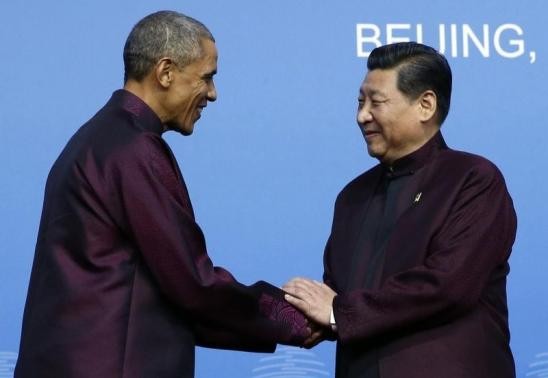China has been steadily laying its so-called sovereign claims on what it considers as its rightful territorial waters that span the East and South China seas. But one nation stands in the way of Beijing - America.
On the account of its military might, the United States is essentially tempering the aggressiveness that China has been displaying lately. The two superpowers are not exactly quarreling but Washington is challenging the perceived advances being made by the Chinese Navy over at the South China Sea.
The situation on the region is characterized at the moment as tense that Michael Austin, a history professor at Yale University, has expressed fears that two countries could get locked in a conflict soon. "The U.S. and China are now potentially closer to an armed encounter than at any time in the past 20 years," Austin wrote for The Commentator.
China and the U.S. slugging it out on the region is not a remote possibility considering the prevailing environment, Austin said, adding that three scenarios could play out into a full-scale confrontation between the two countries.
By provocation
In claiming most of the East and South China seas, Austin believes that Beijing is firm on its path and there is no backing down despite urgings from U.S. President Barack Obama to cool down a bit. But China has already put its reputation on the line and any form softening is tantamount to losing face, which for the current Chinese leadership is out of the question.
All indications suggest that China is well-positioned for a showdown with the U.S. but the former will not fire the first shot. Instead, Beijing will ramp up its presence both in the region and even restrict the movements of air and maritime traffic. The idea is to watch and see how Obama will react.
The Chinese bet is, with its hands full on Middle East and European concerns not to mention on the domestic front, the Americans will initially growl at China's bullying tactics. Eventually, however, Washington will back down, Austin said.
By obligation
The U.S. maintains military agreements with its allies in the region, which dictates that Obama would defend its friends if and when attacked. In the news lately is the increasingly straining relationship between China and the Philippines as the latter drums up international attention and support.
Manila is accusing Beijing of violating its borders, the most glaring example of which is China's ongoing building of structures on waters that both countries claim. The two parties occasionally engage in brief episodes of word war. If the situation graduates into a conflict, the U.S. will have to come to Manila's aid in fulfillment of its existing treaty with the Asian nation.
By accident
Many battles were started unintentionally and the same thing could happen between China and the U.S. in the East and South China seas. As China accelerates its military activities in the region so is America, which has been conducting series of war games with its regional partners like Japan and Australia.
With all the patrols and exercises happening in the region, accidents could easily happen like when a Chinese combat fighter and a U.S. navy aircraft collided mid-air in 2001. Nothing drastic transpired then but the present condition is totally different, Austin noted on his report. If any of the two parties will react differently, war could become inevitable.



























